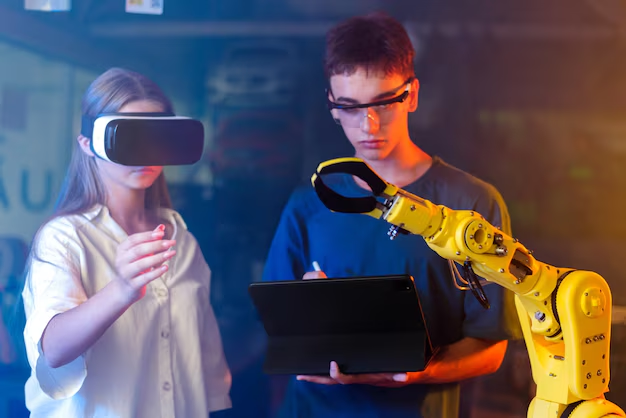Artificial Intelligence (AI) and Machine Learning (ML) are two of the most exciting and transformative technologies in the world today. As they continue to evolve, they hold the potential to reshape industries, improve efficiencies, and revolutionize how we interact with technology. In this article, we will explore some key predictions for the future of AI and ML, focusing on the advancements that are likely to have the greatest impact.
The Growing Role of AI and Machine Learning
AI and ML have already begun to influence various sectors, from healthcare to finance to entertainment. However, the true potential of these technologies is just beginning to unfold. As AI and ML become more sophisticated, their ability to learn, adapt, and make decisions without human intervention will continue to increase, leading to a range of new possibilities.
AI and ML in Everyday Life
In the near future, AI and ML will become even more integrated into our daily lives. From smart home devices to personalized recommendations on streaming platforms, these technologies are already enhancing convenience and efficiency. As AI becomes more advanced, we can expect even greater personalization, with technology anticipating our needs and behaviors before we even express them.
Key Predictions for the Future of AI and Machine Learning
1. AI-Powered Automation in the Workforce
One of the most significant advancements predicted for AI and ML is their role in automation. Many jobs that require routine tasks are already being automated by AI, from data entry to customer service. In the future, AI-powered systems will be able to take on even more complex roles, such as decision-making, problem-solving, and management tasks. This could lead to more efficient businesses and could significantly reduce labor costs in many industries.
2. Advanced Natural Language Processing (NLP)
Natural Language Processing (NLP) allows machines to understand, interpret, and generate human language. In the future, NLP will become more sophisticated, allowing machines to engage in deeper, more meaningful conversations with humans. We could see advancements in virtual assistants that can hold multi-turn, context-aware conversations and better understand nuance, emotions, and intent.
3. Healthcare Revolution with AI

The healthcare industry is poised for a major transformation due to AI and ML. AI algorithms are already being used to assist doctors in diagnosing diseases, analyzing medical images, and creating personalized treatment plans. In the future, AI will become an even more integral part of healthcare, offering real-time monitoring, predictive analytics, and early detection of illnesses, leading to more efficient and effective care.
4. AI in Creative Industries
AI is expected to play a significant role in creative fields like music, art, and writing. Already, we have seen AI-generated artwork and music compositions. In the future, AI could become a co-creator, helping artists and designers push the boundaries of creativity. It could also be used to generate personalized content at scale, from marketing materials to entertainment tailored to individual tastes.
5. AI and Ethics: Addressing Bias and Transparency
As AI systems are increasingly used in decision-making processes, concerns about fairness, bias, and transparency will continue to rise. Future advancements will focus on improving the ethical aspects of AI, ensuring that algorithms are fair, unbiased, and transparent. This may involve developing new frameworks and regulations to guide the responsible use of AI across industries.
6. Quantum Computing and AI Synergy
Quantum computing has the potential to revolutionize AI and machine learning by dramatically increasing processing power. In the future, AI and quantum computing could work together to solve complex problems much faster than traditional computing methods. This synergy could lead to breakthroughs in fields like drug discovery, climate modeling, and cryptography.
Challenges to Overcome for AI and ML Advancements
While the future of AI and ML holds great promise, there are several challenges that need to be addressed before these technologies can fully realize their potential.
Data Privacy and Security
As AI systems rely heavily on data to learn and make decisions, the issue of data privacy and security becomes more critical. Striking a balance between innovation and protecting user privacy will be essential as AI becomes more pervasive.
Job Displacement Concerns
While automation and AI can lead to greater efficiency, there are concerns about job displacement. As AI takes over more tasks traditionally performed by humans, there will be a need to address workforce retraining and reskilling to ensure a smooth transition.
Conclusion
The future of AI and Machine Learning is incredibly exciting, with advancements set to revolutionize industries, improve everyday life, and solve some of humanity’s most pressing challenges. From automating the workforce to transforming healthcare and creative industries, these technologies will continue to reshape our world. However, careful attention must be paid to the ethical and societal implications of these advancements to ensure they are used responsibly and for the benefit of all.
FAQs
Q. What are the most significant advancements predicted for AI and Machine Learning?
Some key advancements include AI-powered automation in the workforce, advancements in Natural Language Processing (NLP), and AI’s role in healthcare, creative industries, and quantum computing.
Q. How will AI impact the job market?
While AI is expected to automate many routine tasks, it could also create new job opportunities, especially in fields related to AI development, data science, and ethics. There will be a need for reskilling and workforce adaptation to new roles.
Q. What are the ethical concerns surrounding AI?
As AI systems are used in decision-making, there are concerns about bias, fairness, and transparency. Future AI development will focus on ensuring these systems are ethical, unbiased, and accountable.
Q. Will AI replace human creativity in the arts?
AI is expected to become a tool for co-creating in the arts rather than replacing human creativity. It will assist in pushing creative boundaries but will still rely on human input for meaning and emotional depth.


